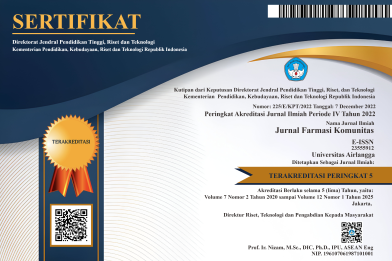Hubungan Pengetahuan dan Kemampuan Memilah Informasi Hoaks dengan Status Vaksinasi COVID-19 di Kalangan Masyarakat Kota Surabaya
Downloads
COVID-19 telah menjadi pandemi global sejak tahun 2020 dan menyebabkan angka kematian yang signifikan di Indonesia. Program vaksinasi adalah salah satu cara yang dilakukan oleh pemerintah Indonesia untuk memutus penyebaran virus. Namun, peredaran misinformasi mengenai vaksin di masyarakat menjadi hambatan kesuksesan program vaksinasi. Penelitian ini bertujuan untuk mengetahui hubungan pengetahuan, kemampuan memilah informasi hoax dan status vaksinasi COVID-19 masyarakat Kota Surabaya. Metode yang digunakan dalam survei ini adalah observasional dengan pendekatan cross sectional. Sampel diambil secara accidental sampling yaitu masyarakat Surabaya yang memenuhi kriteria inklusi. Data dikumpulkan melalui kuesioner yang terdiri dari 3 jenis pertanyaan berupa pengetahuan, kemampuan memilah informasi mitos atau fakta, sikap, dan status vaksinasi. Hasil penelitian dianalisis secara deskriptif. Sebanyak 297 responden berpartisipasi dalam survei. Mayoritas responden adalah laki-laki dengan rentang usia 17-25 tahun dan berstatus pelajar/mahasiswa. Lebih dari 80% responden menjawab benar pada aspek pengetahuan tentang vaksinasi COVID-19, termasuk kemampuan mengenali mitos dan fakta tentang vaksin COVID-19. Responden juga menyadari bahwa pemberitaan yang salah (hoaks) berpotensi menurunkan angka partisipasi vaksinasi. Terdapat hubungan antara pengetahuan dengan kemampuan memilah informasi hoaks, tidak terdapat hubungan antara pengetahuan antara status vaksinasi (p>0,005) dan terdapat hubungan berkebalikan antara kemampuan memilah informasi hoaks dengan status vaksinasi (p<0,005; r=-0,182). Meskipun demikian, sejumlah responden menyatakan kesulitan untuk mengakses informasi yang benar dan dapat dipercaya untuk menjawab hoaks. Hal ini menunjukkan perlunya upaya dalam menyediakan akses informasi yang lebih baik kepada masyarakat.
Ahmad, A., and Nurhidaya. (2020) ‘Media Sosial dan Tantangan Masa Depan Generasi Milenial.', Avant Grade: Jurnal Ilmu Komunikasi, 8(2), pp. 134-148.
Allington, D., McAndrew, S., Moxham-Hall, V., and Duffy, B. (2021) ‘Coronavirus conspiracy suspicions, general vaccine attitudes, trust and coronavirus information source as predictors of vaccine hesitancy among UK residents during the COVID-19 pandemic.', Psychological Medicine, 53(1), pp. 1–12. doi: https://doi.org/10.1017/S003329172100143 4
Andalucia, L. R. (2021). Pengawalan Keamanan, Khasiat, dan Mutu Vaksin COVID-19 Sebelum dan Sesudah di Peredaran.
Badan Litbangkes Kementrian Kesehatan RI. (2021). Tantangan Pelaksanaan Vaksinasi COVID-19 di Indonesia. Viewed 09 September 2021. https://www.litbang.kemkes.go.id/tantangan-pelaksanaan-vaksinasi-covid-19-di-indonesia/.
BPOM RI (2021)Penerbitan Persetujuan Penggunaan Dalam Kondisi Darurat Atau Emergency Use Authorization (EUA) Pertama Untuk Vaksin COVID-19. Viewed 09 September 2021. https://www.pom.go.id/new/view/more/pers/584/Penerbitan-Persetujuan-Penggunaan- Dalam-Kondisi-Darurat-Atau-Emergency- Use-Authorization--EUA--Pertama-Untuk- Vaksin-COVID-19.html .
Callaghan, T., Moghtaderi, A., Lueck, J. A., Hotez, P., Strych, U., Dor, A., Fowler, E. F., and Motta, M. (2021) ‘Correlates and disparities of intention to vaccinate against COVID-19.', Social Science & Medicine, 272(113638), pp. 113638. https://doi.org/10.1016/j.socscimed.2020.11 3638.
Carrieri, V., Madio, L., & Principe, F. (2019) ‘Vaccine hesitancy and (fake) news: Quasi" experimental evidence from Italy.', Health Economics, 28(11), pp. 1377–1382. https://doi.org/10.1002/hec.3937
COVID-19 Hotline. (2021) Vaksin Sinovac berisikan Virus Hidup yang dilemahkan serta mengandung Sel Vero danBahan-Bahan Berbahaya. Viewed 09 September 2021. https://covid19.go.id/p/hoax- buster/salah-vaksin-sinovac-berisikan-virus- hidup-yang-dilemahkan-serta-mengandung- sel-vero-dan-bahan-bahan-berbahaya.
Czochor, J., & Turchick, A. (2014) ‘Introduction. Vaccines.', The Yale Journal of Biology and Medicine, 87(4), pp. 401–402. doi: 10.3389/fimmu.2020.01408
Dror, A. A., Eisenbach, N., Taiber, S., Morozov, N. G., Mizrachi, M., Zigron, A., Srouji, S., & Sela, E. (2020). Vaccine hesitancy: the next challenge in the fight against COVID-19.', European Journal of Epidemiology, 35(8), pp. 775–779. doi: https://doi.org/10.1007/s10654-020-00671- y.
Gupta, R., and Kumar, K. (2020) ‘Mcluhan's Predictions: An Empirical Study of Social Media an Extension of Journalists.', International Journal of Research and Analytical Reviews, 7(3), pp 622-628. doi: https://doi.org/10.1729/Journal.24883.
KEMENKES RI. (2021). Vaksin. Viewed 09 September 2021. https://vaksin.kemkes.go.id/#/vaccines.
KOMINFO. (2021). Hoaks Vaksin COVID-19. Viewed 09 September 2021. https://web.kominfo.go.id/sites/default/files/ Total%20Isu%20Hoaks%20Vaksin%20C ovid-19%20sd%2023%20Agustus%202021.pdf,.
Liputan 6. (2021) Kominfo Ungkap Hoaks Seputar Vaksin COVID-19 Tembus 2.003 Konten. https://www.liputan6.com/cek- fakta/read/4636699/kominfo-ungkap-hoaks- seputar-vaksin-covid-19-tembus-2003- konten. Viewed 09 September 2021.
Loomba, S., de Figueiredo, A., Piatek, S. J., de Graaf, K., and Larson, H. J. (2021) ‘Measuring the impact of COVID-19 vaccine misinformation on vaccination intent in the UK and USA.', Nature Human Behaviour, 5(3), pp. 337–348. https://doi.org/10.1038/s41562-021-01056
Menni, C., Klaser, K., May, A., Polidori, L., Capdevila, J., Louca, P., Sudre, C. H., Nguyen, L. H., Drew, D. A., Merino, J., Hu, C., Selvachandran, S., Antonelli, M., Murray, B., Canas, L. S., Molteni, E., Graham, M. S., Modat, M., Joshi, A. D., and Spector, T. D. (2021) ‘Vaccine side-effects and SARS-CoV-2 infection after vaccination in users of the COVID Symptom Study app in the UK: a prospective observational study.', The Lancet Infectious Diseases, 21(7), pp. 939–949. doi: https://doi.org/10.1016/S1473-3099(21)00224-3
Nemat, A., Bahez, A., Salih, M., Raufi, N., Noor, N. A. S., Essar, M. Y., Ehsan, E., & Asady, A. (2021) ‘Public Willingness and Hesitancy to Take the COVID-19 Vaccine in Afghanistan.', The American Journal of Tropical Medicine and Hygiene, 105(3), pp. 713–717. https://doi.org/10.4269/ajtmh.21-0231
Priastuty, P.C., and Rahmanto, A. N. (n.d.) Hoaks tentang Vaksin Covid-19 di Tengah Media Sosial.', Prosiding Seminar Nasional Unimus, 3(2020), pp. 391-399.
Rief, W. (2021) ‘Fear of Adverse Effects and COVID-19 Vaccine Hesitancy: Recommendations of the Treatment Expectation Expert Group.', JAMA Health Forum, 2(4), pp. 210804. doi: https://doi.org/10.1001/jamahealthforum.20 21.0804
Ritchie, H., Mathieu, E., Rodés-Guirao, L., Appel, C., Giattino, C., Ortiz-Ospina, E., Hasell, J., Macdonald, B., Beltekian, D., & Roser, M. (2020). Coronavirus Pandemic (COVID- 19).
Röltgen, K., Powell, A. E., Wirz, O. F., Stevens, B. A., Hogan, C. A., Najeeb, J., Hunter, M., Wang, H., Sahoo, M. K., Huang, C., Yamamoto, F., Manohar, M., Manalac, J., Otrelo-Cardoso, A. R., Pham, T. D., Rustagi, A., Rogers, A. J., Shah, N. H., Blish, C. A., and Boyd, S. D. (2020). ‘Defining the features and duration of antibody responses to SARS- CoV-2 infection associated with disease severity and outcome.', Science Immunology, 5(54), pp. 1-20. doi: https://doi.org/10.1126/sciimmunol.abe0240
Supardi, Sampirno, O. D., and Notosiswoyo, M. (2004). Pengaruh Penyuluhan Obat Terhadap Peningkatan Perilaku Pengobatan Sendiri Yang Sesuai Dengan Aturan. Bul. Penel. Kesehatan, 32(4), pp. 178–187.
The Conversation. (2021). 27% penduduk Indonesia masih ragu terhadap vaksin COVID-19, mengapa penting meyakinkan mereka. viewed 09 September 2021. https://theconversation.com/27-penduduk- indonesia-masih-ragu-terhadap-vaksin- covid-19-mengapa-penting- meyakinkan- mereka-150172.
Wardle, Claire, & Derakhshan, Hossein (2017). Information Disorder: Toward an interdisciplinary framework for research and policy making. Council of Europe Report. Viewed 09 September 2021
WHO (2020) Vaccine efficacy, effectiveness and protection. Viewed 09 September 2021. https://www.who.int/news- room/feature-stories/detail/vaccine-efficacy- effectiveness-and-protection.
WHO (2021). WHO Coronavirus (COVID-19) Dashoard. Viewed 09 September 2021. https://covid19.who.int/table.
Wu, Q., Dudley, M. Z., Chen, X., Bai, X., Dong, K., Zhuang, T., Salmon, D., and Yu, H. (2021) ‘Evaluation of the safety profile of COVID- 19 vaccines: a rapid review.', BMC Medicine, 19(1), pp. 173. doi: https://doi.org/10.1186/s12916-021-02059-5
Copyright (c) 2023 Jurnal Farmasi Komunitas

This work is licensed under a Creative Commons Attribution-NonCommercial-ShareAlike 4.0 International License.
In order to be accepted and published by JFK, author(s) submitting the article manuscript should complete all the review stages. By submitting the manuscript, the author(s) agreed to these following terms:
1. Copyright of the article is transferred to the journal (JFK), by the knowledge of the author, whilst the moral right of the publication belongs to the author. The intended copyright includes the rights to publish articles in various forms (including reprints). JFK maintain the publishing rights to the published articles.
2. The formal legal aspect of journal publication accessibility refers to the Creative Commons Attribution-Non-Commercial-Share Alike (CC BY-NC-SA), which implies that the publication can be used for non-commercial purposes in its original form.
3. Every publication (print/electronic) is open access for educational, research, and library purposes. In addition to the objectives mentioned above, the editorial board is not responsible for copyright infringement
The Copyright Transfer Agreement Form can be downloaded ON THIS FORM.

Jurnal Farmasi Komunitas (JFK) by Unair is licensed under a Creative Commons Attribution-NonCommercial-ShareAlike 4.0 International License.








